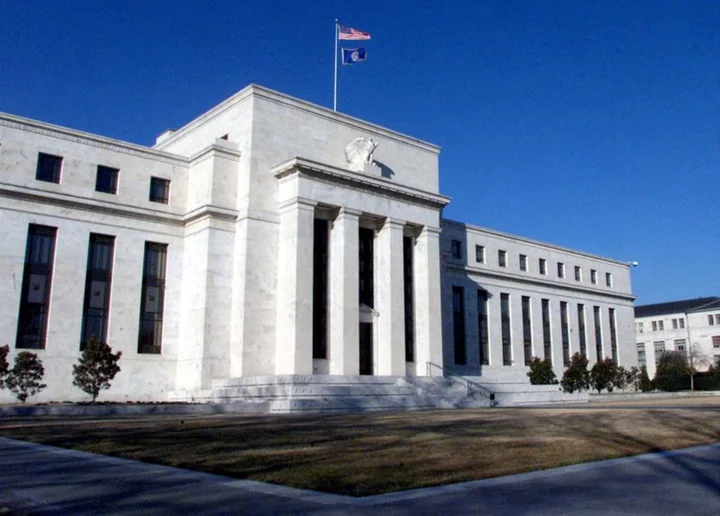By Davide Barbuscia
NEW YORK A feared liquidity drainage in the U.S. banking system as the Treasury refills its coffers has not materialised yet, on the contrary reserves increased recently, assuaging some concerns the bond spree could lead to further credit tightening.
The U.S. Treasury started rebuilding its account through T-bills after the government's debt ceiling was suspended last month. Since early June, the Treasury General Account at the Fed has increased by about $460 billion.
Generally, an increase in government borrowing coincides with a decline in demand for the Fed's overnight reverse repo facility (ON RRP), through which money market funds lend to the Fed, or with a drop in bank reserves parked at the central bank.
When banks absorb the new debt issuance they have less money to lend - a scenario which had some investors worried given ongoing fears of excessive credit tightening amid higher interest rates.
Federal Reserve data this week, however, showed that in the week ending on July 19 reserves increased by about $58.5 billion to $3.22 trillion, while demand for the ON RRP facility declined by $87.3 billion.
"The risk of reserve scarcity in the near-term has receded as more cash has left the RRP facility," said Gennadiy Goldberg, Head of US Rates Strategy at TD Securities USA.
"We'll be watching balance sheet runoff in the next several months to see if that materially changes, but I think the risk has declined as things stand now," he added.
Demand for the Fed's ON RRP has been declining steadily from $2.3 trillion at the end of May to $1.7 trillion as of Friday.
"At the end of May, we had expected more of the drain to come out of bank reserves, as we expected money market funds to keep their money in ON RRP due to still-hawkish Fed messaging at the June FOMC (Federal Open Market Committee) meeting," Citi analysts said in a note this week.
"However, money market funds shifted their allocation out of the RRP facility into outright purchases of T-bills and private repo markets," they said.
Fed officials increasingly track the combined total of reserve and ON RRP balances to get a fuller picture of sector liquidity as they proceed with reducing the central bank's bond holdings at a targeted rate of nearly $100 billion a month. Together they now total $5.3 trillion, the lowest in about two years and down by $700 billion since April with most of that drop coming from ON RRPs, but Fed officials do not yet sense it is threatening reserve scarcity.
Going forward, Citi analysts said they expected the ON RRP to continue declining, although at a smaller pace as the Treasury's financing operations are expected to lose some steam.
(Reporting by Davide Barbuscia; Editing by Dan Burns and Andrea Ricci)

